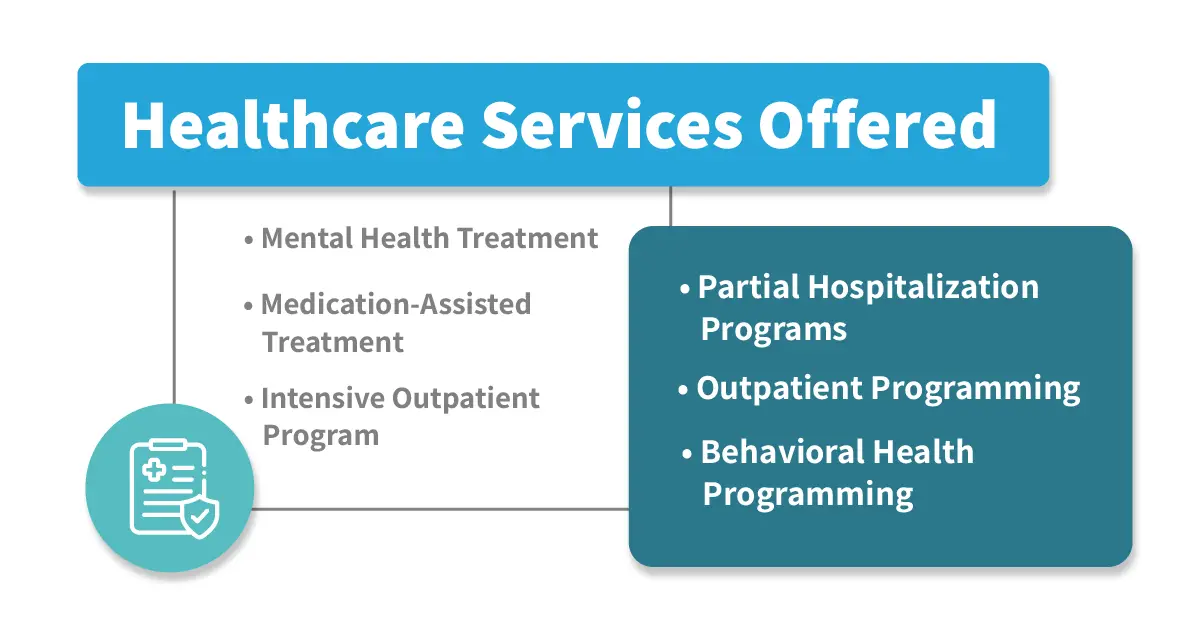Excellence in Healthcare Management Services


Fourteen percent of adults in the United States have a mental illness, according to the National Institute on Mental Health (NIMH). While your local doctor or pharmacy may be able to prescribe medication or provide counseling for certain mental illnesses, they aren’t trained to deal with other issues.
That’s where community mental health services come into play. These services can help you cope with everything from depression and anxiety to bipolar disorder and schizophrenia—and even substance abuse issues. Community mental health services include mental health and behavioral health integrated with medical care for substance abuse treatment, especially MAT (medication-assisted treatments like Suboxone).
Mental Health Treatment
Mental health is a state of well-being in which every individual realizes their potential, can cope with the everyday stresses of life, can work gainfully, and can contribute to their community. Mental health also refers to our well-being, which impacts our everyday lives. It affects how we think, feel and act daily.
The negative impact of mental illness on individuals and society is significant; therefore, people with mental health challenges must get treatment to return to their everyday lives, functioning, and potential.
Behavioral Health
Behavioral health services are provided to help people with mental health and substance use disorders. Mental health services include medication-assisted treatment, an effective treatment method for opiate addiction. Methadone is used for pain management and treatment of heroin addiction. Suboxone is used to treat heroin addiction and other opioid addictions.
Medication-Assisted Treatment
Medication-assisted treatment (MAT) is a comprehensive treatment approach that combines behavioral therapy with medications to help people stop abusing drugs and alcohol. MAT is an effective treatment that can help people become more stable, reduce their overdose risk, and improve overall health outcomes. In addition to behavioral therapies, medication-assisted treatment may include:
- Buprenorphine or naltrexone
- Methadone
- Suboxone
- Other medicines
Buprenorphine or Naltrexone Treatment
Buprenorphine (Suboxone® or Sublocade®) is the gold standard for medication-assisted treatment for opioid addiction. It’s an FDA-approved medicine that blocks the effects of opiates without causing euphoria or severe withdrawal symptoms when someone stops using it abruptly.
Naltrexone blocks opioids from working in the brain and helps prevent relapse after detoxification from heroin or other opioids; it must be taken daily for at least six months before patients can taper down their doses gradually over time until they are no longer taking any medication at all. This process can take up to two years, depending on each person’s situation, usage history, and metabolism of the drug.
Methadone Treatment
Methadone is a medication used to treat opioid addiction. It is an opioid that blocks the effects of drugs like heroin and morphine in the brain and nervous system. Methadone is dispensed by a doctor and can be used as a short-term or long-term solution for treating addiction.
People treated with methadone should not consume any alcohol while on this drug because it may lead to serious side effects such as death (in severe cases).
Suboxone Treatment
A synthetic opioid is used to treat addiction to other opioids, such as heroin and pain medications. Buprenorphine is the main ingredient in Suboxone, which also contains naloxone. Naloxone works to prevent misuse of opioids by people who attempt to abuse it by crushing it into a powder and snorting or injecting it. The small amounts of naloxone make taking too much suboxone unpleasant (causing nausea or dizziness) and can even cause death if taken in large quantities.
Mental Health Services
Community mental health services are available to everyone. If you have a healthcare plan that provides coverage for mental health care, it will cover the cost of community mental health services. Mental health services are confidential, just like any other private healthcare services.
Only licensed providers who work with your healthcare team and case manager will know what’s happening with your care plan. No one else should be able to find out about your involvement in mental health services unless they have a legal right to do so (for example, an employer may need this information to verify eligibility for FMLA leave).
Some states require community mental health agencies to keep records; however, those records can only be shared with third parties if there is a court order or subpoena issued by law enforcement or government officials involved in criminal investigations against patients who receive treatment from these organizations.
Optimizing Mental Healthcare Management
Healthcare management is essential because it optimizes systems and services. Its planning, organizing, and controlling of resources for the delivery of quality health care in a cost-effective manner ensures superior patient outcomes and greater satisfaction for all parties and partners. The health of a community depends on the health of its providers and patients, who are directly linked to their communities.
Healthcare management systems aim for efficient and effective medical services for all people without discrimination by race, gender, or ethnicity. Achieving this goal requires an integrated approach that includes cooperation at all levels—with government, in private sectors, among patients, with third-party payers, and through providers.
Contact Haven Health Management for more information about managed substance abuse and mental health treatment as a provider looking to partner for more scale and efficiency at your practice.
